SIXTY YEARS OF STORIES AT LES
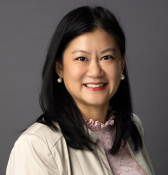
Evelyn Chen
President – LES
Director IPR & Licensing Ericsson
“Being a member of LES has been one of the most important things that I’ve done in my career as an IP licensing professional.”
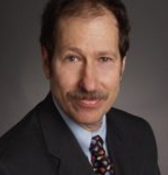
Ed Kahn
Founding Partner, EVP – Rediscovery Life Sciences
“My success was built on concepts I learned at LES, which underscored the intersection of technology and the patent world.”
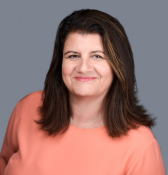
Efrat Kasznik
President and Founder – Foresight Valuation Group
“What makes LES truly unique is its nonprofit, member-driven structure, with a mission of education and networking.”
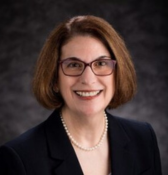
Louise Levien, Ph.D., CLP
Board of Directors, Secretary – LES USA & CANADA
“My volunteer activities in LES have been invaluable in my career growth.”
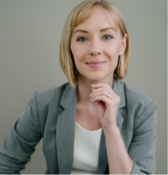
Monika Maleszewsak, Ph.D.
Head of Business Development & Product – Dinamo Biotechnologies
“I joined LES to become more knowledgeable about the intricacies of IP, and how parties may share, divide, and negotiate it.”
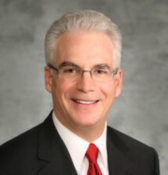
Brian O’Shaughnessy
Partner – Dinsmore, Public Policy VP – LES
“There’s nowhere else that blends such high-level thought leadership with practical deal-making and a true sense of camaraderie.”

Michael Perham, Ph.D.
President Elect and Chair Elect – LES
“Licensing transforms innovation into impact, bridging creativity and world-changing products.”

Jennifer Souter, MBA
Managing Director, Intellectual Property – Texas Tech University
“Having access to those resources and best practices has been extraordinarily valuable for me over the course of my career.”
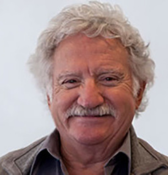
Larry Udell
Senior Consultant – Foresight Science & Technology
“LES is about the connections you make and the relationships you build.”
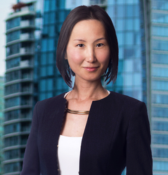
Jayde Wood
Partner – Gowling WLG
“LES’s unique combination of education, networking, and industry influence sets it apart from the other organizations I’ve been a part of.”

Adam Falconer
Founder – Royalty Sense LLC
“The value of LES isn’t about ROI — it’s about authentic connections and advancing the field”

Judge Pauline Newman
US Court of Appeals for the Federal Circuit
“Licensing isn’t just business. It’s how technology moves forward.”

Vincent Bergeron
IP Lawyer, Robic
“I’ve not been sitting, waiting for LES to be great for me, I made LES great for me.”

Judge Paul R. Michel
Consultant, (Retired) U.S. Court of Appeals for the Federal Circuit
“LES offers a unique breadth of perspective—it represents both rights owners and licensees across industries.”

Jennifer Vanderhart, Ph.D.
Managing Director, Secretariat
“Don’t just join a professional organization, participate. “You don’t reap the benefits if you’re not active.”
Evelyn Chen, LES President
Finding a Professional Family
Unlike many LES leaders who spent decades working through chapters and committees, Evelyn’s journey was different. She joined in 2019 through the standards initiative, quickly immersing herself in the LES community. Within months, she was on the LES board, and before she knew it, she was being considered for president.
For LES President Evelyn Chen, joining LES wasn’t just about professional growth — it was about finding a true support system in the world of IP and licensing. However, what truly defines Evelyn’s LES experience isn’t the titles — it’s the people.
“LES has brought me a tight-knit group of friends and colleagues that I can turn to when I need to vent about things that are going on professionally. Or if I just need support or feedback on a certain licensing issue… My LES friends have been a lifesaver.”
For Evelyn, LES is more than a network, it’s a professional family. A place where she can call, text, or chat with colleagues who truly understand her challenges, without the pressure of workplace politics. A space to learn, grow and connect with experts who are always willing to lend a hand.
As we celebrate 60 years of LES, Evelyn’s story is a testament to the power of connection. No matter where you are in your career, LES offers a community that supports, uplifts and helps you thrive.
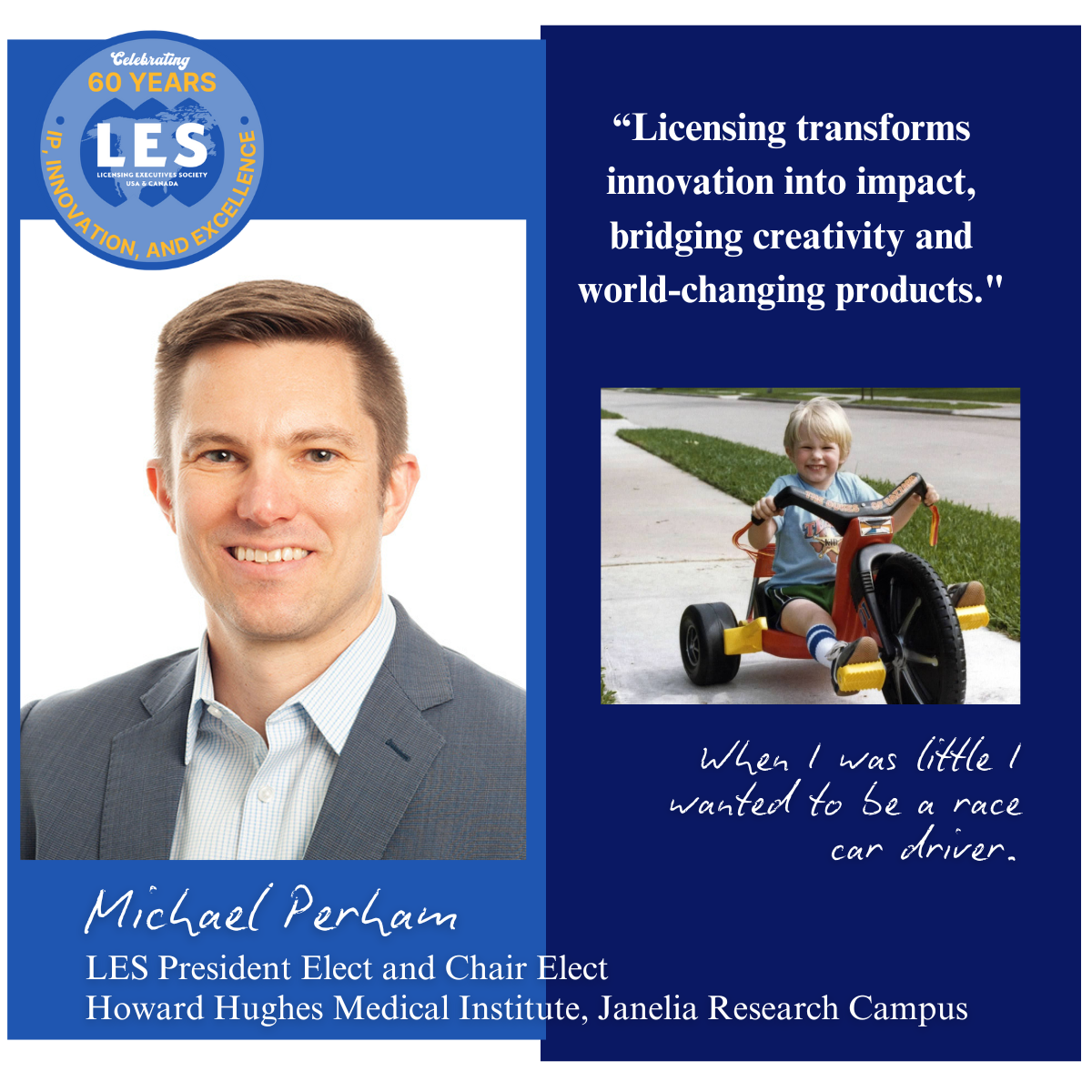
Michael Perham – From the Racetrack to the Fast Lane of Innovation.
As a kid, Michael Perham, Ph.D. dreamed of being a race car driver. While life took him down a different track, his passion for speed and strategy still drives his work today as Director of Innovations and External Relations at HHMI, Janelia Research Campus and President-Elect of LES USA/Canada.
With a career built on bridging creativity with real-world impact, Mike knows firsthand how licensing plays a crucial role in turning cutting-edge ideas into transformative products.
As he puts it: “Licensing transforms innovation into impact, bridging creativity and world-changing products.”
Jennifer Souter – Bridging Science and Business Through LES
For Jennifer Souter, a career in intellectual property began with a deep love of science — one that ultimately led her out of the lab and into the dynamic world of technology transfer. Now the Managing Director for Intellectual Property at the Texas Tech University System, Jennifer’s journey is a testament to how curiosity, dedication and the right community can shape a career.
Jennifer’s career path began in the School of Pharmacy at the University of Mississippi, where she worked in program management for an NIH-funded research group. Though she loved science, she realized the lab wasn’t her final destination. The world of tech transfer — a field that combines science, business, and innovation — proved to be the perfect fit.
At Ole Miss, she gained invaluable experience navigating the intersection of research and commercialization.
Her journey then took her across the globe to Northern Ireland, where she joined Ulster University to help build their technology transfer team. Managing a portfolio of life and health sciences technologies, Jennifer gained firsthand experience in international licensing and the patent process, which profoundly shaped her approach to the business of innovation.
After returning to the U.S., she took on a leadership role at WISIS in Wisconsin, managing IP portfolios across the University of Wisconsin system. There, she not only worked with inventors but also spearheaded programs to encourage researchers to pursue commercially viable innovations. Finally, in 2022, Jennifer joined Texas Tech, where she now oversees the entire IP portfolio for the university system, guiding technologies from assessment to protection and commercialization.
Throughout her career, professional networks have played a critical role. Jennifer has been a longtime member of AUTM, but it was joining LES that opened new doors. “LES has been really beneficial for me because it’s a different side, more of a corporate angle, that complements my other memberships,” she says.
LES offered Jennifer not only valuable educational resources but also an expansive network of industry professionals across diverse sectors. As someone working in drug discovery and high tech, LES became an essential resource for making corporate connections, getting referrals, and finding potential partners. “The networking has been really key,” Jennifer notes. “Having access to those resources and best practices has been extraordinarily valuable for me over the course of my career.”
As she continues to shape the future of Texas Tech’s intellectual property portfolio, Jennifer is a powerful example of how LES empowers professionals to turn innovation into impact. LES serves as more than just a professional organization, but as a bridge between academic innovators and the corporate world.
Louise Levien – From Geochemistry to Licensing: How LES Became My Professional Family
From a young age, Louise Levien’s path to intellectual property and licensing seemed written in the stars, though she may not have known it at the time. A love of math and science was sparked early when her first-grade teacher recognized her natural talent for problem-solving. Her curiosity for the world around her grew as she collected rocks and minerals on family vacations — an early sign of the geochemist she would become.
Louise earned her PhD as an experimental geochemist and began her career at Exxon (now ExxonMobil) as an experimentalist. Despite working in a field unrelated to her academic research, Louise quickly adapted and carved out a successful career in science. But it was a desire for something different that set her on the path toward intellectual property and licensing, a journey that would define the second half of her career.
When an internal group at Exxon was formed to focus on intellectual property, Louise took the leap and requested to join. Her technical background gave her immediate credibility among scientists, but it was the support and education she received through LES that helped her build her expertise in IP and licensing.

Encouraged by a mentor to join LES early in her transition, Louise immersed herself in courses, chapter meetings and the broader LES community. A pivotal moment came during one of those meetings, where she learned about copyleft software licenses — a new concept at the time. Not long after, she applied that knowledge in a meeting at Exxon, impressing her legal colleagues and solidifying her reputation as a trusted voice bridging science and business.
Through LES, Louise not only gained technical knowledge but built a network that became essential to her career. Whether brainstorming contract terms or seeking out internship opportunities for protégés, she found a trusted circle of peers willing to offer insight, advice and support. As a passionate educator, LES also provided Louise with opportunities to give back by developing and delivering training for others looking to grow their skills.
From experimental geochemist to IP and licensing leader, to previous Executive Director of LES USA and Canada, Louise Levien, has built an incredible career. Her journey is a testament to how LES helps professionals at every stage of their careers—providing knowledge, connection and community to fuel success.
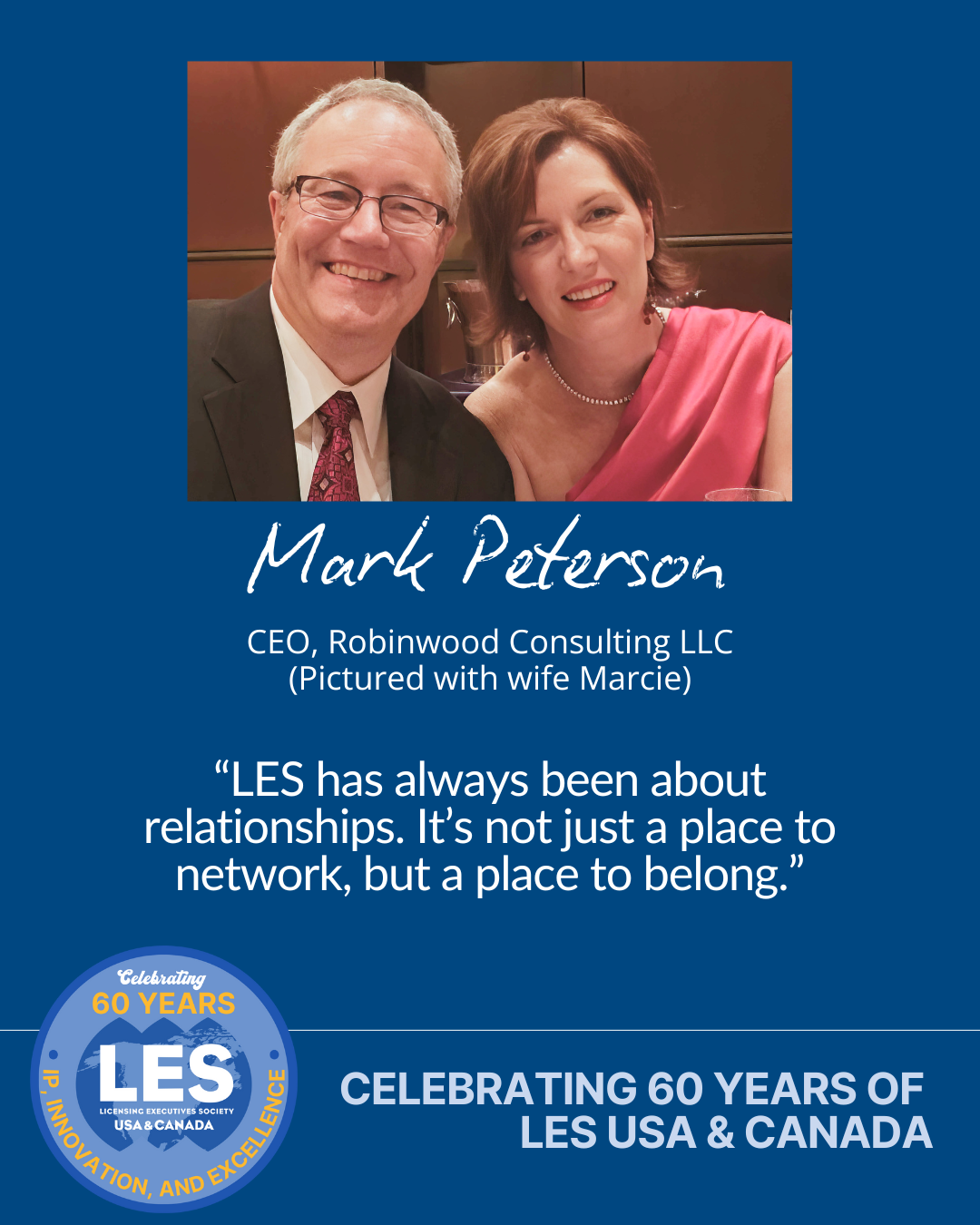
“You Get Out What You Put In”: Mark Peterson Reflects on Decades of LES Engagement
When Mark Peterson joined LES in the 1980s, he had no idea the organization would become one of the most meaningful through-lines in his professional and personal life. From working closely with longtime LES leaders to pulling off one of the society’s most financially crucial meetings, Peterson’s involvement has spanned decades, friendships, and unforgettable stories.
Early in his LES journey, Peterson received advice that has since guided his involvement and become something he’s passed on to countless new members: “You get out of this society what you put into it.” That phrase came from longtime LES member Elton Dry. “I was told that somewhere in that first year,” Peterson recalls. “And it was proven to be 100% right.”
Through Elton, Peterson found an early sense of belonging. “Because I was Elton’s friend, I became Jay Simon’s friend and their friends’ friend,” he says of he and his wife. Over time, that circle grew to include people who, like him, invested time and energy into LES by teaching classes, joining committees, and organizing meetings. “If all you’re gonna do is come to the meeting and look to find some clients, you will not get out of it what you can,” he explains. “You’ll always be able to get more by putting into the society first.”
Growing With the Society Through the Years
Peterson’s own commitment took many forms over the years, from committee service to helping plan national conferences, to helping establish courses and a pathway to CLP certification. He remembers when LES annual meetings were smaller and entirely volunteer-run.
While the meetings have grown in size and scope, Peterson reflects on how that shift changed the dynamic. “The Boston meeting in 2004 was like 1700 attendees,” he says. “It was almost too big for the people who had grown up in the smaller meeting years.” Still, he recognizes the value in those gatherings, especially when paired with deeper, more focused engagement. “When the meetings get that big, you go to meet the people who are in smaller, more focused areas, like those in semiconductors or something,” he says. “Because it just doesn’t work otherwise.”
He’s also seen (and helped shape) the evolution of LES culture. Peterson reflects on the camaraderie and connection that came as a result of the shared meals and time together outside of the official meetings. That culture is vital to the success of LES and its members and certainly where he built some of his strongest relationships and best ideas.
Making an Impact Through Volunteer Leadership
Mark and his wife Marcie were involved in supporting several annual meetings for LES over the years. But, one of Mark’s proudest accomplishments was the opportunity to help coordinate and lead the 2016 annual meeting with very short notice. 2016 was a challenging year and the meeting had to be profitable.
“Jeff Whittle called me and said, ‘Mark, you’re the only person I know with enough experience, who’s done this kind of stuff before and I need your help,’” Peterson remembers. Though he had never run an annual meeting on his own, he had served as finance chair for several, and knew what it would take to make the meeting great. “I didn’t exactly know how to tell my wife I’d said yes after saying no so many times over the years,” he laughs. But the society needed help, and both Mark and Marcie stepped in.
Through savvy budgeting, strong attendance, and cost-effective planning, that meeting was successful, bringing in much needed resources that would support the activities of LES for the next couple of years.
Encouraging Change and Breaking Barriers
That wasn’t the only pivotal moment Peterson had a hand in. Back in the ’90s, he encouraged Kathleen Denis, who would go on to become LES’s first female president, to get involved. “She started giving me grief about how the board of directors of LES was nothing but a good old boys network,” Peterson recalls. “And I said, ‘Why don’t you just do something about it?’” She did and made history in the process.
The Power of Relationships and Giving Back
Looking back, Peterson says he’s gotten far more from LES than he ever anticipated. “I’ve gotten back what I put into LES tenfold over.” That return has come in the form of deep relationships, professional opportunities, and personal growth.
One example was when he met Ed Kahn at a meeting in the early ’90s. He had a small struggling consulting firm, Peterson jokes– and I had an entertainment budget, so I invited him to dinner. That encounter led to a strong friendship, meaningful collaborations, and new business for both of them. “He connected me to a client that gave me one of my most memorable cases.”
Asked to reflect on what he’d tell new members joining LES today, Peterson doesn’t hesitate. “Get involved with a committee, chapter or another activity. Then when you go to an annual meeting, you will be able to connect face to face with people you may have only known through calls or Zoom. Then those relationships become a tighter bond.”
For Peterson, that’s what LES has always been about. Not just a place to network, but a place to belong.
Larry Udell: A Luminary in Licensing, Innovation, and Human Connection

This year, LES proudly commemorates its 60th anniversary, reflecting on the individuals who have profoundly influenced the field of intellectual property and commercialization. Among these influential figures is Larry Udell, a pioneering entrepreneur, educator, and advocate whose remarkable career has spanned over six decades. With a legacy woven through innovation, mentorship, and unyielding passion for invention, Udell stands as a beacon of inspiration for aspiring inventors and licensing professionals alike.
An Early Passion for Invention
Larry Udell’s journey began in the Chicago suburbs, where he was born in 1931 into a family that imbued him with a sense of curiosity and a passion for creativity. From his early days, Udell exhibited an innate drive to innovate, crafting various inventions and exploring the realms of technology and entrepreneurship. His educational path took an unconventional turn when he left traditional schooling and ventured into the world of consulting and business.
In 1957, Udell founded the California Inventor’s Association, hosting an exhibition that brought together 321 inventors showcasing their ideas and designs. The event drew significant attention from major publications and laid the foundation for what would become a lifelong commitment to empowering innovators. This inaugural exhibition marked Udell’s first significant step into organizing and supporting inventors, demonstrating his early understanding of the need for structured support within the inventor community.
Lessons in Entrepreneurship
Over the decades, Udell has served as a mentor and educator, drawing from his extensive experience to inspire others. He has taught entrepreneurship courses at various institutions, including California State University and New Mexico Tech. His passion for education extends internationally, having lectured in countries such as Egypt and Canada and at esteemed universities from Stanford to MIT.
Through his work, Udell has empowered countless students and aspiring entrepreneurs, teaching them the intricacies of launching and managing new ventures. “The more you learn, the more you will understand what it is you can or cannot do,” he emphasizes. His commitment to education has not only fostered innovation but also underscored the importance of intellectual property rights, reflecting his belief in the value of protecting ideas and inventions.
A Lifelong Commitment to Licensing
Larry Udell’s involvement with the Licensing Executives Society began in 1982. His dedication to the organization culminated in the establishment of the Silicon Valley Chapter in 2000, which has since grown to become one of the most active chapters in the organization. Udell’s leadership and commitment to promoting licensing and business development within the realm of intellectual property have significantly influenced the organization and the industry as a whole.
“Lessons in LES are invaluable,” Udell states, reflecting on the diverse opportunities available to members. The society provided him with a platform to connect with other professionals in various sectors, broadening his understanding of licensing’s role in innovation. His participation enabled him to advocate for inventors’ rights and engage with policymakers, thereby shaping the legal landscape of intellectual property.
A Multifarious Career
Udell’s contributions to entrepreneurship and licensing have not solely been academic. He has co-founded or consulted for over 40 companies, ranging from tech startups to established corporations. His consulting work has spanned across disciplines, assisting both budding entrepreneurs and Fortune 500 companies in navigating the complexities of invention development and marketplace introduction.
One of Udell’s noteworthy ventures was his work with Eye-Com, a medical startup that specialized in eye-tracking technology. Eye-Com gained acclaim for creating the technology that allowed Stephen Hawking to control his wheelchair. In 2016, the company was sold to Google for $75 million, marking a significant milestone in Udell’s career.
Yet, his professional accomplishments extend further. Udell has represented numerous organizations and governmental bodies, including participating in initiatives with the World Intellectual Property Organization (WIPO) under the United Nations. He has lectured for the U.S. Patent and Trademark Office, sharing his expertise with a wider audience and actively engaging in discussions about the importance of intellectual property rights.
Advancements in Technology: The Birth of BatterySavers
Larry Udell continues to innovate, most recently through his project, BatterySavers, which seeks to address the critical issue of battery longevity. The idea behind BatterySavers arose from collaborative efforts with his colleagues at New Mexico Tech. The concept centers around extending the life of batteries by efficiently utilizing energy reserves often wasted in traditional battery use.
The technology boosts low-voltage output from depleted batteries, making it usable again. This advance is particularly significant in fields where power availability is critical, such as military, medical, and emergency services.
“I wake up every morning and count my blessings,” he shared, affirming his commitment to seeing BatterySavers commercialized. Udell’s vision for this project embodies his enduring passion for invention, driving him to push boundaries and seek innovative solutions that can have a lasting impact on consumers and industries alike.
A New Era of Mentorship and Community Engagement
As someone intimately involved in fostering connections, Udell believes in the power of communal growth. “LES is about the connections you make and the relationships you build,” he explains, highlighting how the organization has facilitated collaboration among professionals from diverse backgrounds. This interconnectedness has proven invaluable to both new and established inventors, providing them with resources, insights, and platforms to launch their ideas.
Udell’s dedication to mentorship extends beyond mere professional development; it resonates in his philosophy of empowering others to pursue their dreams and share their ideas. He encourages new licensing professionals to actively engage in organizations like LES, gain insights, and value the relationships built within the community. This collaborative spirit is something Udell views as indispensable to the journey of inventors and entrepreneurs.
Celebrating 60 Years of LES: A Gratitude for the Journey
As the Licensing Executives Society celebrates this significant milestone, recognizing individuals like Larry Udell highlights the essence of the organization’s mission. His unwavering dedication, leadership, and enthusiasm have left an indelible mark on the landscape of licensing and innovation. As he reflects on his journey, Larry Udell embodies the very spirit of entrepreneurship—characterized by resilience, creativity, and a robust commitment to the community at large.
In his words, “There are no limitations.” This mantra encapsulates Udell’s life philosophy, urging innovators and entrepreneurs to embrace opportunities and explore uncharted territories. The enthusiasm with which he continues to approach his work serves as an inspirational reminder that the quest for knowledge and innovation never ceases.
A Legacy to Aspire To
Larry Udell’s multifaceted career represents a lifelong quest for innovation and connection. As he strives to inspire the next generation of inventors and licensing professionals, his journey stands as a testament to the possibilities that arise when passion, creativity, and collaboration converge. Through his work with LES and his ongoing projects like BatterySavers, he is paving the way for future generations, ensuring that the spirit of invention remains vibrant and impactful.
As LES looks forward to the future, celebrating the milestones achieved over the past 60 years, it is individuals like Larry Udell who embody the organization’s mission and vision. His life and work continue to inspire countless innovators, encouraging them to pursue their ideas, protect their creations, and connect with a global community of like-minded individuals committed to the advancement of knowledge and invention. With each new chapter, Udell writes an inspiring narrative, reminding us all that we are capable of building a legacy defined by our resilience and creativity in the face of challenges.
Monika Maleszewska, PhD
Our 60th New Member in 2025
The LES community would like to extend a warm welcome to Monika Maleszewska, PhD — the “60th” new member joining during our 60-year celebration in 2025!
Monika began her career in the life sciences after earning an MSc in Biotechnology and a PhD in Cell and Molecular Biology. But it was her cross-functional leadership roles that sparked her passion for Business Development and driving partnerships between companies and technologies.
Today, Monika heads BD at a startup where she strives to become an impactful leader in the biotech industry. By joining LES, she plans to deepen her understanding of licensing and intellectual property, which she’s found to play a key role in enabling innovation.
A natural networker, Monika is eager to get involved with LES—attending courses, webinars, and connecting at local chapter events.

 Ed Kahn – Founding Partner, EVP at Rediscovery Life Sciences
Ed Kahn – Founding Partner, EVP at Rediscovery Life Sciences
In his book, Innovate or Perish: Managing the Enduring Technology Company in the Global Market, Ed Kahn thanks three entities for their contributions to his success in IP and technology transfer.
One, the US Constitution and the brilliant patent system in the US; two, New York City Public Schools where he was fortunate to learn; and three? None other than the Licensing Executives Society (LES). Kahn believes that LES’s leaders and teachers, and the “openness to newcomers and commitment to free-flowing knowledge” was a big part of his growth and expertise in IP, which ultimately found its way into his book published in 2007.
LES colleagues helped hone his knack for translating what oh too brilliant scientists taught about the technical “features” of their creations – that no developer/licensee could understand – into the “benefits” of them.
Working with Raytheon, Xerox, IBM, and others, Ed developed a cadre of “dangerously eclectic PhDs” who could also mine the “gems” among the intellectual property of clients’ corporate IP “rock pile” of patents.
He most enjoyed situations where he could encourage tying research and development to IP strategy and helping clients understand that their tech can be used to create more impact for their businesses through IP.
His success was built on concepts he learned at LES, which underscored the intersection of technology and the patent world.
He still works in this intersection today, advocating for drug and device repurposing. How else might one use an approved drug for one disease in another unexpected illness to save more lives?
Ed realized quickly that educational material was essential for his growth. In fact, the first course he took with LES, he considers, “the best course ever” for a beginner. He would later serve as the Boston chapter chair in the late 80’s and found his way to the national membership chair for a time. LES quickly became his primary source of networking, expanding his community, and for marketing his business.
Although market and regulatory changes surrounding innovation and patents have shifted in the US, Ed knows that LES’ influence on his success was direct. The underlying foundation that IP adds value to companies and is an important part of business strategy, is one he still believes today.
In fact, when asked if he had to sum up his convictions around IP in one sentence, Ed states, “To try to be a great business person without mastering IP, is an invitation to failure.”
Thank you for being a vital part of our LES history Ed!
Jayde Wood, Partner, Gowling WLG
For Jayde Wood, a global IP expert and partner at Gowling WLG, LES has been more than just a professional association; it’s been a place to grow, connect and lead.
She says 👉 “LES’ unique combination of education, networking, and industry influence sets it apart from all the other organizations I’ve been involved with. The caliber of thought leadership and content, especially in the USA & Canada chapter, is just outstanding.”
In a field where deal-making can be isolating, Jayde found a collaborative and welcoming home through LES — one that champions education, connection, and global impact. She mentions, “I truly appreciate that LES fosters a collaborative environment for licensing professionals and provides continued education and sets industry standards.”
Thank you, Jayde, for being part of the LES story!
Efrat Kasznik, President and Founder of Foresight Valuation Group
I started my professional career as a CPA, but business school shifted my path to consulting. I was drawn to litigation consulting, and over time, IP litigation, particularly around damages, caught my attention. By the early 2000s, companies were looking to monetize patents, especially in the wake of the dot-com bust. That wave of innovation and disruption pulled me deeper into IP strategy and, eventually, IP valuation, a field I helped grow within the consulting firm I worked at.
My entrepreneurial side and my Silicon Valley location led me to co-found and serve as CFO of several Silicon Valley startups, but I always returned to consulting. Thirteen years ago, I founded Foresight Valuation Group to focus on IP valuation and monetization strategies. Around the same time, I started teaching an IP valuation and strategy class at the Stanford Graduate School of Business, which I have been teaching since then.
I’ve been involved with LES for over 20 years. My first encounter was in the late ’90s when LES was a member-referred society. I joined through a referral, and after starting Foresight, I became more involved through the Silicon Valley Chapter, sponsoring and organizing events. I later became involved with LES & USA-Canada, where I chaired the high-tech sector, joined the LES USA & Canada Board, and chaired the 2022 Annual Meeting in San Francisco; our first post-COVID gathering. I also became involved in LES Education, creating and teaching IP Valuation classes.
LES has been vital to my professional growth. First and foremost, I view LES as a trusted referral network and a place where I’ve built long-term professional and personal relationships. I’ve also expanded into new areas by engaging with LES content and tapping into the incredible community of experts.
What makes LES truly unique is its nonprofit, member-driven structure, with a mission of education and networking. Unlike pay-to-play IP conferences and media platforms, LES events are merit-based; anyone can contribute valuable content or get involved in many different ways. It’s not just about CLE credits or sponsorship; it’s about peer learning, mentorship, leadership, and trust. That’s what’s kept me coming back and what prompted me to get involved as a volunteer.
Brian O’Shaughnessy, Partner Dinsmore, LES Public Policy VP
 For Brian O’Shaughnessy, LES has never been just a professional organization — it’s been a cornerstone of his career and a driver of progress in the IP and licensing world. A past president of LES and now its Senior Vice President of Public Policy, Brian is one of the most recognizable names in the industry. With more than 35 years of experience as a registered patent attorney, and currently chairing the IP Transactions and Licensing Group at Dinsmore in Washington, D.C., he brings unmatched insight to the technical, legal, and strategic dimensions of IP.
For Brian O’Shaughnessy, LES has never been just a professional organization — it’s been a cornerstone of his career and a driver of progress in the IP and licensing world. A past president of LES and now its Senior Vice President of Public Policy, Brian is one of the most recognizable names in the industry. With more than 35 years of experience as a registered patent attorney, and currently chairing the IP Transactions and Licensing Group at Dinsmore in Washington, D.C., he brings unmatched insight to the technical, legal, and strategic dimensions of IP.
Brian’s leadership journey has spanned many dimensions of the innovation economy, from crafting global IP strategies to advocating for pro-innovation policy as Chair of the Bayh-Dole Coalition and a founding member of the United States Intellectual Property Alliance (USIPA). But he says the LES community has remained a consistent and powerful force throughout.
“LES is where professionals across law, business, academia, and technology come together not only to learn and grow, but to shape the very future of IP,” Brian reflects. “There’s nowhere else that blends such high-level thought leadership with practical deal-making and a true sense of camaraderie.”
During his presidency and continuing in his policy leadership role, Brian has championed the critical role LES plays in influencing public discourse and ensuring the value of IP is recognized by policymakers, the private sector, and the public alike.
“One of LES’s greatest accomplishments,” he notes, “is our ability to evolve. Whether it’s navigating the rise of AI, open innovation models, or shifting global IP landscapes, LES continues to lead with purpose and adaptability.”
As LES celebrates 60 years, Brian’s legacy is one of connection, consequence, and dedication to a thriving innovation ecosystem.
Happy 60th, LES. 🎉 And thank you, Brian, for helping shape its story.
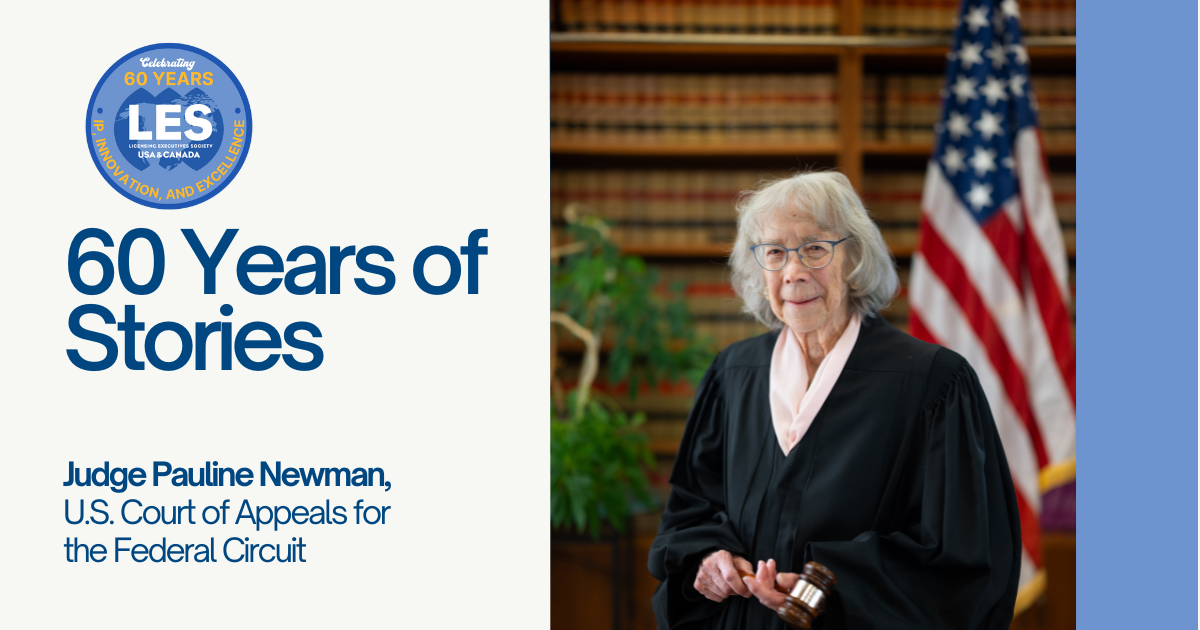 Judge Pauline Newman, US Court of Appeals for Federal Circuit
Judge Pauline Newman, US Court of Appeals for Federal Circuit
Judge Pauline Newman: A Legacy of Principle, Innovation, and Leadership
When Judge Pauline Newman says she never planned to become a judge, you believe her. “It never occurred to me,” she said with characteristic directness. “It wasn’t anywhere in my mind.” And yet, the very absence of planning is what makes her career all the more extraordinary.
Nominated by President Reagan in 1984 after the sudden death of a prior appointee, Judge Newman became one of the first members of the newly formed U.S. Court of Appeals for the Federal Circuit… a court she had helped conceptualize. Her decades on the bench would cement her legacy as a fierce intellectual force and an unwavering advocate for technological progress, inventors, and the rule of law.
Though widely respected now as the “heroine of the patent system” and the court’s most prolific dissenter, Newman’s influence began long before her judicial robes. A scientist by training, she was one of the original members of the Licensing Executives Society. “It turned this narrow specialty into a profession,” she said, speaking of technology licensing in the postwar boom. “And the society was an immediate success.” LES legitimized licensing as a vital function of innovation… and Newman was there to witness its birth.
She speaks of LES and its founder, Mark Finnegan, with deep admiration. “Mark just did it. When he saw something that ought to be done, he didn’t wait; he led.” It’s a model of leadership she clearly respects, and one she emulated quietly throughout her own career.
As a judge, Newman’s dissents were often prescient. So much so that the Supreme Court adopted many of them into law. By one count, 13 of her dissents were later vindicated by the nation’s highest court. But she’s more surprised than proud. “What’s amazing to me is that my colleagues got it wrong,” she said, without bitterness. “Each of us brings our own understanding to the problems. That’s human nature.”
Newman’s impact, however, wasn’t only in what she wrote… it was in how she led. She routinely assigned the most interesting cases to junior judges on her panels, believing it fostered growth and satisfaction. “Not all judges think that’s what they should do,” she said. “But it was very clear to me that it was appropriate.” That instinct—to lead by lifting others—runs through her life’s story.
Now in her late nineties and still entangled in a battle over her judicial status, she speaks candidly about her current legal limbo, expressing disappointment not just in the process, but in what it signals. “The penalty was imposed before there was any development of the truth,” she says. Still, her advice is resolute: “Fight back. If you see something that isn’t quite right, don’t shrug it off. It can only get worse.”
For those entering the profession today, Judge Newman offers a vision that blends conviction with clarity. “You are responsible for the truth. You are responsible for justice.” And for organizations like LES, she sees its continued role in shaping both law and leadership. “It’s where the action was and still is. Licensing isn’t just business. It’s how technology moves forward.”
In Judge Newman’s world, justice, science, and innovation are inseparable, and none should be left to chance. Her story is a reminder that legacy doesn’t come from planning. It comes from principle.
Beyond her judicial accomplishments, Judge Newman’s contributions to the field of technology licensing and innovation management remain equally significant. As one of the earliest members (and a true pioneer) of the Licensing Executives Society, she helped shape an emerging profession at a time when intellectual property was still a niche concern for many.
Founded in 1973, LES quickly grew from a small, specialized group of licensing professionals into a global network dedicated to promoting the exchange and commercialization of intellectual property. The society brought legitimacy and structure to a field that was evolving in tandem with rapid scientific and technological advances after World War II.
Newman’s involvement in LES was not incidental; it reflected her keen understanding that innovation does not exist in isolation. Licensing technology and ideas, negotiating agreements, and protecting inventors’ rights are integral parts of the innovation ecosystem. The society’s efforts helped bridge gaps between inventors, corporations, universities, and governments… facilitating not just transactions, but partnerships and progress.
Her background in chemistry and scientific research gave Newman a rare perspective among legal professionals. She could appreciate the technical complexities underlying patents and licensing deals, and she used that insight to advocate for a patent system that truly encouraged innovation. As the intellectual property landscape expanded, LES provided a platform where multidisciplinary collaboration could thrive—legal minds, scientists, business strategists, and policymakers working side by side.
Over the years, LES chapters have grown worldwide, hosting conferences, publishing research, and offering education to nurture new generations of licensing professionals. The society’s ongoing mission mirrors Newman’s own legacy: to sustain a framework where innovation can be recognized, protected, and shared for the greater good.
Judge Newman’s journey, from scientist to patent law trailblazer, from one of the Federal Circuit’s founding judges to a revered advocate for inventors, embodies the very spirit of LES. Her respect for LES’s founder, Mark Finnegan, and her early involvement underscores how her career and the society’s evolution were intertwined. She represents a commitment to leadership through action, dedication to truth, and a belief that the commercialization of technology is not just business, but a driver of societal advancement.
In reflecting on her life’s work, Judge Newman’s message resonates clearly with members of LES and beyond: that the future of innovation depends as much on principled legal stewardship and visionary leadership as it does on scientific discovery itself.
Adam Falconer: Building Connections and Advancing Innovation Through LES
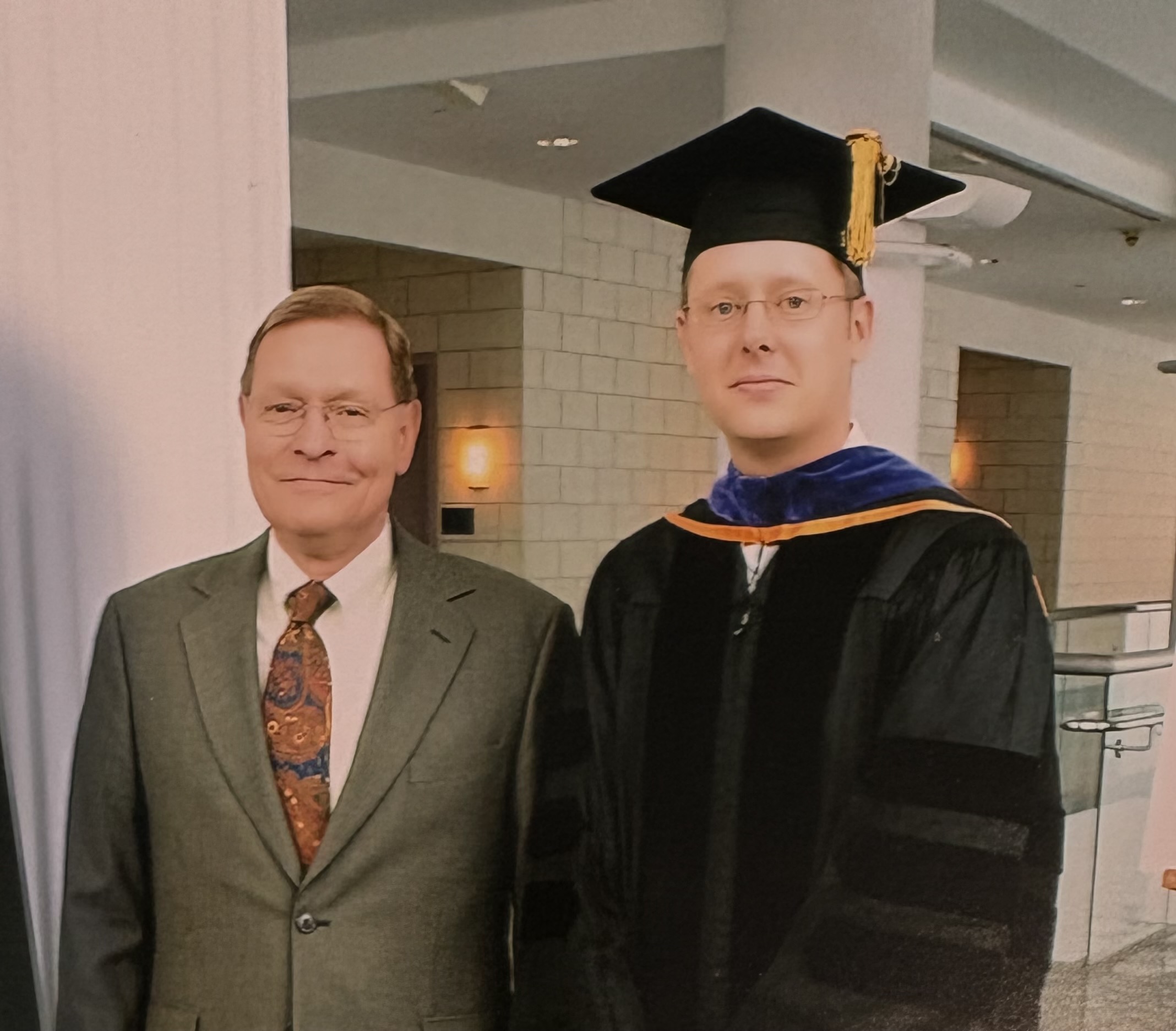
From early influences to shaping best practices, Adam Falconer’s journey with LES is rooted in humility, collaboration, and a deep commitment to intellectual property innovation.
Adam Falconer began his career in management consulting with one of the big four accounting firms, blending project management, finance, and application-layer programming. His work on large-scale deployments at major telecommunications and media companies gave him a front-row seat to the power of technology in business. Yet, the billable-hour grind and the technical focus of consulting left him wanting something more.
“I realized that just pure play technical skills are a wonderful foundation, but I wanted to complement those with other skills that I thought would forward my career,” Falconer explained. This realization led him to attend Syracuse University College of Law, where he discovered a passion for intellectual property and technology transfer.
At Syracuse, Falconer found a unique program focused on innovation and the movement of intangible assets. “As a programmer, you see implementation, but understanding who owns the innovation and where the money flows was an entirely new perspective,” he said. The program emphasized the real-world business value of intellectual property, laying the groundwork for his career in licensing and valuation.
The Influence of Professor Ted Hagelin
A turning point in Falconer’s career came through Professor Ted Hagelin (pictured with Adam above), a visionary educator and thought leader. Hagelin’s multidisciplinary approach brought together law, engineering, and business students to solve technology transfer challenges. These teams analyzed competitive landscapes, developed financial models, and created comprehensive reports—experiences that mirrored the pressures and complexities of real corporate environments.
“Professor Hagelin taught me about patents, technology transfer, valuation, disputes… all the aspects that have shaped my career,” Falconer said. He credits Hagelin not only for his education but also for his introduction to LES. At Hagelin’s recommendation, Falconer began studying the LES International Guide to Licensing Best Practices, a resource he still values today. “I think I still have that book, copyright 2002. It became my grown-up playbook,” he recalled.
Career Progression and LES Connections
During law school, Falconer clerked at the respected law firm Hiscock & Barclay (now Barclay Damon), gaining hands-on experience in IP law. However, instead of pursuing a traditional legal career, he transitioned into tech transfer roles at leading research universities, including the University of Nebraska and the University of Illinois. There, he managed licensing deals, research collaborations, and IP evaluations under the Bayh-Dole Act.
A chance encounter in Chicago with Frank Bernatowicz, a prominent expert witness in IP and commercial litigation, further shaped Falconer’s trajectory. Bernatowicz introduced him to the high-stakes world of litigation consulting. “He had hundreds of trials and depositions under his belt. Learning from him was like getting a masterclass in the practical side of IP,” Falconer reflected.
Through all these professional milestones, LES remained a constant. “Between Professor Hagelin, the law firm where I clerked, and Frank Bernatowicz, LES kept coming up over and over again,” Falconer explained. The organization’s resources provided guidance and credibility during his early years, and its network of professionals helped him navigate the complexities of IP valuation and licensing.
Why LES Matters
Falconer speaks passionately about the unique value LES brings to the field. “LES is a volunteer organization. We’re not a media company, and we’re not a lobbyist group. The intellectual rigor and inclusiveness make it unique,” he said. For him, LES offers a rare blend of authenticity, diversity of thought, and shared commitment to advancing best practices in licensing.
“LES has become core to who I am professionally. It helps you listen, connect, and stay current.”
Falconer believes that LES’s multidisciplinary environment is key to its strength. “You might run into a PhD engineer, a corporate attorney, a professional accountant, or an economist at any LES event. That diversity of perspectives aligns perfectly with innovation,” he explained.
From Student to Educator
Over the years, Falconer has transitioned from a student of LES best practices to an educator and thought leader within the organization. He is particularly proud of his work developing a course on IP damages, a topic previously underserved in LES’s educational offerings.
“There wasn’t a course on damages. We saw an unmet need, so a small group of us… collaborated to create one,” Falconer shared. The course covers methodologies, litigation scenarios, and the evolving role of technology and data in expert witness work.
“It’s not just about best practices anymore; it’s about how to deploy those practices with the right tools and methodologies.”
Falconer also notes how advancements in artificial intelligence have transformed market research and data analysis. Tasks that once required weeks of manual work can now be accomplished in hours. While this brings efficiencies, it also raises new challenges for experts in valuation and litigation. “It’s going to make my life harder and easier at the same time,” he joked.
Defining Moments and Mentorship
In recent years, encouragement from colleagues like Sam Wiley, a board member of LES, prompted Falconer to deepen his involvement with the organization. “That nudge was important and impactful,” he said. Through the LES Valuation and Pricing Committee, Falconer now contributes to critical discussions that shape professional practices.
Falconer is quick to emphasize that LES is not a purely transactional organization. “If you join LES expecting a direct ROI, you’re missing the point. The value comes from authentic connections, thought leadership, and the opportunity to advance your field,” he explained. For him, the relationships and learning experiences gained through LES have become indispensable to his professional life.
Innovation, Technology, and the Future
Falconer is deeply interested in how emerging technologies, particularly AI, are changing the landscape of IP. Legal tech tools that analyze millions of documents or model damages scenarios are revolutionizing litigation and valuation practices. “There’s licensing all over the place,” Falconer observed, noting how intangibles like software, data, and algorithms are becoming as valuable as physical assets.
Personal Perspective
Despite his achievements, Falconer remains grounded. “I’ve had a good ride surfing these waves, but it’s never been just about me,” he said. Outside of work, he enjoys the simple pleasures of family life and going fishing, which he describes as a way to recharge and reflect. “It’s more about being outdoors and enjoying good friendships,” he added.
Forward with Structure: Vincent Bergeron’s Steady Hand
The past LES Board Member reflects on building stability, fostering community, and helping the next generation of licensing professionals thrive.
When Vincent Bergeron, a Canadian member, reflects on his time with LES and its international counterpart, LESI, his focus is not on titles or recognition but on relationships, structure, and sustainability. He speaks with quiet conviction, emphasizing that effective leadership is not about noise or charisma. “I try not to get emotional in difficult times,” he explained. “We need to stay focused on the facts, the outcomes, the priorities.”
That approach, both calm and deliberate, guided him during his tenure on the Board and as the International Chair of the LESI Young Members Committee, particularly during a period of uncertainty and rapid change for the Society. His work built on a career-long passion for intellectual property and innovation, fields that Bergeron sees as combining everything that excites him: technology, business, creativity, and collaboration.
From Law to Licensing Bergeron’s path to intellectual property law was far from linear. As a young professional, he was drawn to science, technology, and music. “I was most interested in the entertainment industry as a whole,” he said. He’s even the drummer for a band, called Le Clan de la Savate, who has enjoyed growing popularity in Quebec. In the early 2000s, he even ran a tech startup before pivoting into law. It was there, at the crossroads of creativity and commerce, that he found his calling in intellectual property.
“IP was kind of where I found all the things I loved in life: technology, science, business, and entertainment,” he said. Early in his legal career, one of his mentors, François Painchaud (a past LES President), encouraged him to join LES. “He told me, ‘Vince, you should join LES. That’s the best place where you’ll get to network with people your age and create a good North American and international network of IP professionals.’”
Bergeron joined the Young Members Congress (YMC), a vibrant group within LES dedicated to early-career professionals. From his very first event, the connection was immediate. “By the end of that event, I was kind of on the board,” he said with a laugh. “It was pretty quick that I made some friends, and the rest is history.”
Why Networking Matters
While LES is well-known for its exceptional educational programs, Bergeron emphasizes that the real value of the organization lies in its network. “For me, the part that was the most instrumental for my career was really the network of people I met through LES,” he explained. “Those people became friends… and friends for life. Now I’ve been involved for around fifteen years, and most of them are either on the board, chairing committees, or holding very important roles in their organizations.”
Bergeron is adamant that young professionals shouldn’t wait until they are well-established to join LES. “Being involved at an early stage of my career was something I cannot state enough; it’s been critical to my career as a whole,” he said. “Join as soon as you can.”
Moments That Defined His Career
Bergeron recalls two moments with LES that shaped his professional trajectory. The first was in 2019, when he served as international chair of the Young Members Congress. He hosted the Pan-American YMC event in Montreal, which became one of the most memorable LES gatherings of the last two decades.
“It turns out that it was so popular for young members that it was sold out,” he said. “We had to actually refuse people. We raised so much money in sponsorship because it was something very popular, that we had more than enough to cover our expenses.” The event featured a mix of exceptional content during the day and a spectacular evening program. “We had a boat ride on the Saint Lawrence River with all the attendees. We had lobster, filet mignon, drinks for everyone, a circus show. People still talk about that event as one of the best LES events of the last twenty years.”
His second defining moment came a few years later, in 2022, when LES returned to in-person events following the pandemic. At the annual meeting in San Francisco, Bergeron was asked to moderate the keynote opening panel. The speakers were giants in the industry: Shane O’Reilly (Meta), Karen Emerglock (Stanford University), and Patrick Patnode (GE Licensing).
“The room was packed with people,” he said. “And me, the young guy from the province of Quebec, for whom English is a second language, was moderating this panel in San Francisco. I still can’t believe to this day that people had enough confidence in me to do that. But it was clearly a highlight of my professional career.”
Leadership and Membership Growth
Beyond events, Bergeron’s involvement with LES extended to its board, where he worked with fellow members Ann Cannoni on membership and Louise Levien on marketing efforts. Together, they helped reverse a trend of declining membership by launching initiatives aimed at younger professionals, among other things.
“Our goal was to make that curve go up again, and we actually were able to do it,” he said. “One way to do it was to focus on what we branded at the time ‘emerging leaders.’ We wanted to make sure it was not only like a 60-year-old people’s social club, but something where younger people belonged.”
He also championed member orientation and connection. “When you arrive at an annual meeting and you’re younger, you don’t know anyone. The last thing we want as an organization is for these people to feel like they don’t belong there,” he explained. “We always insisted on having orientation cocktails for first-time attendees, making sure people met others right away.”
The Philosophy of Showing Up
When asked what advice he would give to new members, Bergeron’s message is simple but powerful: participation is everything.
“To make the most out of an LES membership, you need to show up,” he said. “Don’t wait for things to happen… make them happen. Join a committee, propose topics, help out with anything you’re good at. You’ll receive a lot, but if you give a lot as well, that’ll be the best deal for everyone.” He credits this active approach for much of his professional growth. “I’ve not been sitting, waiting for LES to be great for me,” he said. “I made LES great for me.”
Better Professional, Better Person
Bergeron is quick to note that the value of LES extends beyond business. “It helped me become a better IP professional because every year at the annual meeting, I learned things you cannot find on the Internet,” he said. “But as a human being, it also helped me… just knowing how to interact with people, create relationships, and understand different customs and industries.”
The friendships he has built through LES are among his greatest takeaways. “If someone I’ve met through LES called me urgently, I would help them without hesitation,” he said. “It’s about building strong relationships with people you can count on.”


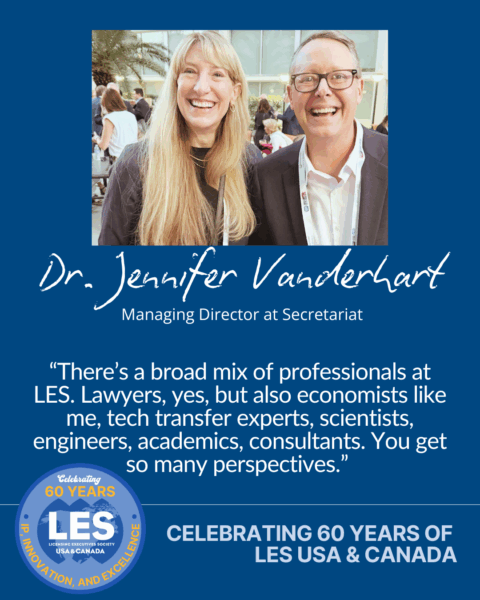 Dr. Jennifer Vanderhart Reflects on Two Decades of Intellectual Property Work and LES Engagement
Dr. Jennifer Vanderhart Reflects on Two Decades of Intellectual Property Work and LES Engagement
How a Damages Consultant, Economist, and Yoga Champion Found Community and Purpose Through LES
Dr. Jennifer Vanderhart has built her career on clarity, whether testifying in high-stakes patent disputes or building accessible educational tools for the next generation of licensing professionals. With more than two decades in economic consulting and active involvement in LES, Jennifer brings both depth and reach to the field of intellectual property.
“I thought I would go into academia,” she reflects. “But I started working as a damages consultant while finishing my PhD, and I’ve been doing this work ever since.”
That path, grounded in economics, shaped by complex disputes, and guided by collaboration, has positioned Jennifer as a leader within the LES community. From her early days attending DC chapter meetings, to helping design the organization’s damages education course, she has found both professional and personal value in staying involved.
Building Expertise, Case by Case
Jennifer’s work as a damages expert has placed her at the center of major IP litigation for decades. She has been retained in hundreds of cases, testified more than 75 times in deposition or court, and often works on behalf of clients navigating the complexities of licensing, valuation, and infringement.
“My first expert case was a licensing dispute,” she recalls. “It was a matter involving Powerchip Semiconductor. That was the first time I was the named expert, and it’s stayed with me. Licensing has come into my work in many different ways over the years.”
Though trials are rare (most cases settle) Jennifer values the discipline of preparation. “I’ve flown to trials only to have them settle at the last minute,” she says with a smile. “But every case requires precision. You have to be ready.”
A Learning Mindset
That preparation and structure also inform her approach to education, both as a student and as a teacher. Jennifer co-chaired the development of LES’s damages course and regularly leads sessions at LES conferences. “I enjoy teaching,” she says. “The students are engaged, they ask thoughtful questions. It’s rewarding to talk through concepts and see people connect the dots.”
The link between education and practice is something she values deeply. Though she originally envisioned a career in academia, Jennifer sees her current work—testifying, consulting, mentoring—as a natural extension of that impulse to teach and explore.
The Value of Community
Jennifer has been a member of LES since the mid-2000s and currently serves as vice chair of the Washington, D.C. chapter. She describes the organization as unusually welcoming, especially for non-attorneys working in IP.
“There’s a very broad mix of professionals at LES,” she says. “Lawyers, yes, but also economists like me, tech transfer experts, scientists, engineers, academics, consultants. You get so many perspectives.” That range of disciplines creates space for meaningful connections. “I was president of a nonprofit and needed help with trademark and copyright filings,” she recalls. “I reached out to an attorney I knew through LES. It made a difference to know and trust someone already.”
While she’s seen many shifts in professional culture—including a widespread pivot to remote work—Jennifer hopes to see more in-person engagement return. “The DC chapter has always been very active,” she says. “We’re working on a damages symposium now, and it’s great to build those in-person spaces again.”
Measured Advice
Asked what guidance she would offer new professionals in the licensing space, Jennifer is direct: “Get involved.”
“Don’t just join a professional organization… participate,” she says. “Be on a committee. Attend the events. Bring your cards. People still remember you if they have your card.”
She sees LES as an especially strong place to build relationships and context. “There’s the national structure, but also very active local chapters,” she notes. “Start small. Find a good fit, grow from there.”
That steady approach (to observe, engage, contribute) has defined her own trajectory. “You don’t reap the benefits if you’re not active,” she says simply.
A Steady Contributor
From the courtroom to the conference room, Jennifer brings rigor to her work and generosity to her professional community. She isn’t loud about her accomplishments… but her influence is felt widely across LES and beyond.
Outside of consulting, Jennifer is a longtime yoga practitioner and occasional teacher. She also competes in yoga at the national and international level. “I’ve won my age group in the U.S. and placed second in India,” she says. “It’s a different kind of discipline, but it supports everything else. It keeps me grounded.”
Through teaching, leadership, and personal example, she reminds her peers what it looks like to stay curious, stay connected, and keep showing up—on the mat or at work.
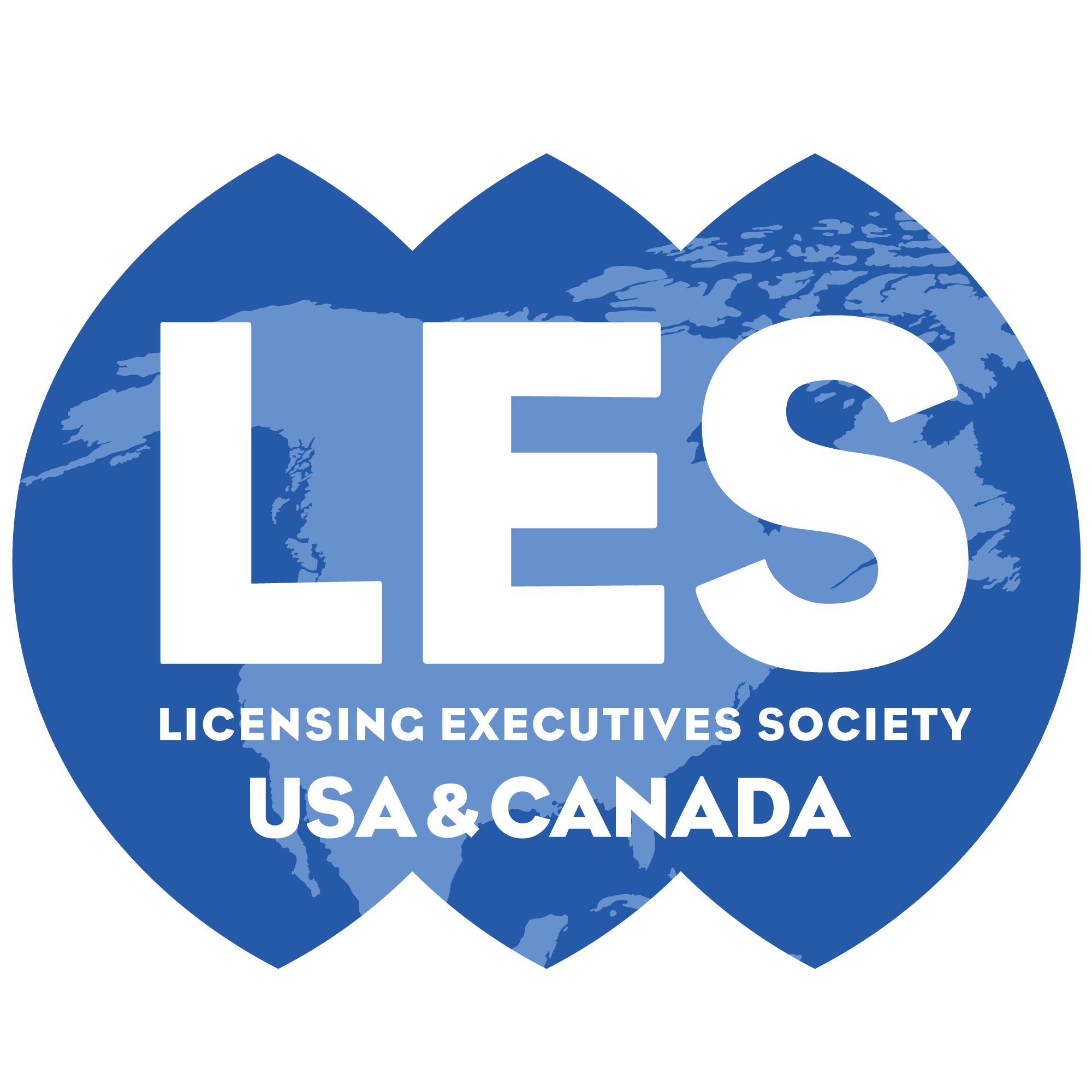
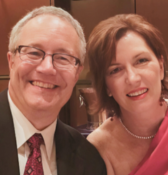
Get Social